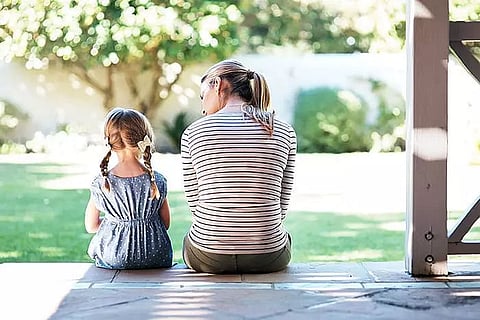
- Home
- Live Blog
- Breaking News
- Top Headlines
- Cities
- NE News
- Sentinel Media
- Sports
- Education
- Jobs

As one progresses from childhood to the pre-teen phase and teenage, one invariably goes through a lot of changes and hurdles. Many times, there are communication issues that come up both for the parent and the pre-teen/teen. Hence during this phase, it is essential for parents to provide non-judgmental support to their children.
Suicide is the third leading cause of death among youngsters between 10 and 19 years of age. However, suicide is preventable. Youth who are contemplating suicide frequently give warning signs of their distress. As significant adults there are several ways that we can look out for our children and provide support as required. Further it is also helpful to be aware of the various signs of distress.
So what do you do when you're worried that your child might be feeling suicidal?
It is essential to maintain an open channel of communication at all times. At certain times young teens are unable to articulate or put their feelings together and express. Providing a safe sense of space plays an important role in enabling the person to open up and share whenever required. Instead of waiting for the teen to open up you can openly express that you have observed that he/she is not looking okay and gently inquire if he/she would like to talk and share about the problem or situation that is bothering him/her.
Sometimes parents feel that if they talk about suicide it will make suicidal thoughts more acute/real and suicide more likely to happen. However, the truth is that a child invariably feels better if he/she has someone safe in the family to talk to. This creates a feeling that he or she is more understood and that there is more empathy in the home.
As a parent or significant adult, you should always listen for the unspoken words. Keep a watch for any changes in the teens' sleep or eating patterns and social activities. Is he/she beginning to isolate from peers and others around? Has he/she stopped participating in his/her favourite activities? These are warning signs of distress.
Many times as parents we sincerely believe that 'all is well' in our small world and think that tragedies/mishaps cannot happen in our lives. But the fact is that suicide can happen to anyone. Young people of all races, ethnicities, gender identities, sexual orientations, income levels and community backgrounds die by suicide every year.
Most often significant adults tend to push aside upheavals within the family as 'acting out' or attention seeking behaviour. However it is strongly recommended to take your teens words seriously. At any point in time if he/she says or writes statements like the ones below (or similar) please do take serious note:
I want to die
I wish I could sleep and never ever wake up
If I am not around no one would miss me
Nothing matters anymore
You need not worry about me much longer
(This is not an exhaustive list)
Many children who attempt suicide will tell their parents ahead of time (though others do not). These words indicate an urgent need for help.Don't risk being wrong about this. Take every statement about suicide seriously.
Irrespective of how we feel as parents (maybe angry or hurt) it is critical to put aside our feelings and be available for the child. Assure your child that no matter what, you are always available when he/she needs you. At certain times the risk of suicide may not appear severe to you but it is essential to treat every sign with utmost seriousness and address the same. It is also strongly recommended to seek help from mental health professionals without any delay. Immediate action can help save a life.
In the meantime it is also very crucial to keep the environment as safe as possible. Keeping harmful and toxic substances away from your child including sharp objects or anything that could prove lethal is strongly recommended.
It is also helpful to engage your child in regular physical and relaxation activities as these will help to elevate mood. Help your child to divide tasks into small parts and take them up one by one. Doing this diffuses stress and keeps him/her engaged. The successful accomplishment of a task also translates to a sense of fulfilment. Ultimately it will help to keep the child positive and motivated.
On this World Suicide Prevention Day, 10th September 2022, we can all create hope through action and express to the ones experiencing suicidal thoughts that we care, that we are there and there is hope always.
By: Gariasi Dutta
Psychological Counsellor
Down Town hospital
Guwahati
Also Read: The Trail of an Uplifting Fragrance
Also Watch: